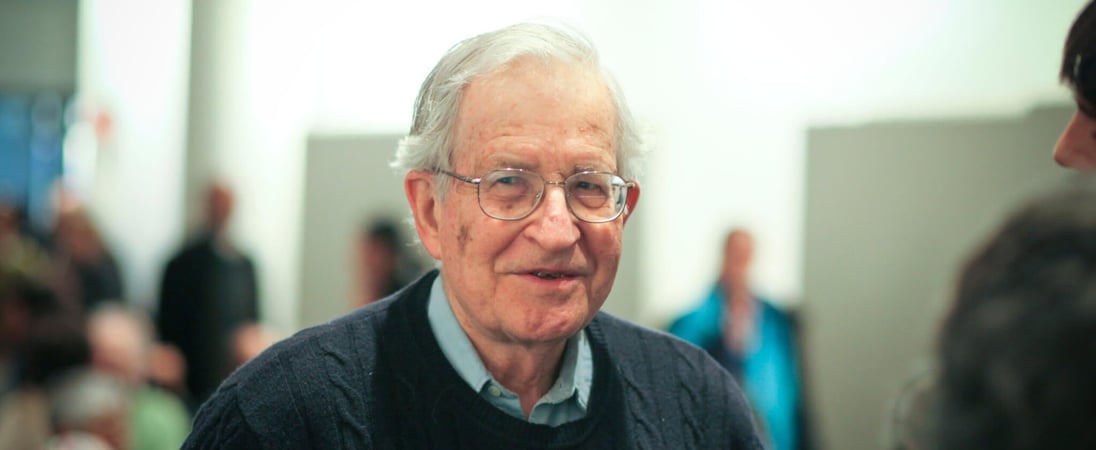
Noam Chomsky's birthday
Widely referred to as “the father of modern linguistics,” American linguist, philosopher, political activist and cognitive scientist Avram Noam Chomsky was born on December 7th, 1928, in Philadelphia, Pennsylvania, to Jewish immigrant parents. Early on, Chomsky developed an interest in politics, particularly left-wing and anarchist ideologies, while visiting alternative bookstores in New York City. In 1945, after academically excelling in school, Chomsky attended the University of Pennsylvania, where he studied logic, philosophy, and languages and taught Hebrew to support himself while studying. He graduated in 1951 and went on to become a member of the Society of Fellows at Harvard University, where he continued his research for his doctoral dissertation. During his time at Harvard, Chomsky published his first academic article, Systems of Syntactic Analysis (1952) and in 1955 presented his thesis on transformational grammar, which earned him a PhD.
In 1955, Chomsky became an assistant professor at the Massachusetts Institute of Technology (MIT). He split his time between teaching and working on a mechanical translation project. Two years later he was promoted to associate professor and also became a visiting lecturer at Columbia University. Chomsky published his first book, Syntactic Structures, in 1957, in which he went against the dominant trends in the linguistics field. He further opposed other views in the field, most notably that of language as a learned behavior, and through his published critics, Chomsky began to be seen as an intellectual in the field. Chomsky founded MIT’s graduate program in linguistics and was given tenure in the Department of Modern Languages and Linguistics in 1961.
During the 1960s, Chomsky published several more books on his linguistic ideas: Current Issues in Linguistic Theory (1964), Aspects of the Theory of Syntax (1965), Topics in the Theory of Generative Grammar (1966), Cartesian Linguistics: A Chapter in the History of Rationalist Thought (1966), and Language and Mind (1968). He also published, in collaboration with fellow linguist Morris Halle, The Sound Pattern of English (1968). Chomsky did not limit his published works to the field of linguistics as he became openly outspoken against the Vietnam War in 1962 and later published a critique essay “The Responsibility of Intellectuals” in 1967. His first political book, American Power and the New Mandarins, was published in 1969, followed by At War with Asia (1970), The Backroom Boys (1973), For Reasons of State (1973), and Peace in the Middle East? (1974). During this time, Chomsky also became involved in left-wing activism, getting arrested several times and even being put on President Nixon’s list of enemies. To this day, Chomsky has maintained his position as a political dissident and has penned more than seventy books and essays on topics of national and international conflicts and his views on them.
Thanks to his contributions to the field of linguistics, Chomsky has earned international fame and has been awarded several honorary doctorates. After the 1970s, he continued to publish on linguistics, reviewing and expanding on his past writings. In 1972, Chomsky presented Studies on Semantics in Generative Grammar, followed by The Logical Structure of Linguistic Theory and Reflections on Language (1975). He also co-authored a book on media criticism and propaganda models together with Edward S. Herman, called Manufacturing Consent: The Political Economy of the Mass Media in 1988. He also sparked a controversy regarding his views of freedom of speech, even for those who denied the Holocaust. During the 1990s, his activism intensified, always being vocal on political conflicts around the world.
In 2002, Chomsky retired from MIT. However, he continued to conduct research and seminars on campus as professor emeritus. In 2017, Chomsky became a part-time professor at the University of Arizona, where he first came to teach a short-term politics course and was later offered a position in the linguistics department. To this day, he has written more than 150 books on topics that cover linguistics, war, politics, and mass media.
Also on this date...
National Slime Day
Gooey fun offering endless sensory play, creativity, and stress relief, captivating both kids and adults with its fascinating textures.
National Cotton Candy Day
Head over to your local funfair for an airy, spun-sugar treat or whip up creative cakes and cocktails like cotton candy cupcakes and fairy floss martinis.
International Civil Aviation Day
The realm of flight, where the sky becomes a canvas for human ingenuity and exploration, offers a thrilling journey beyond the ground.



